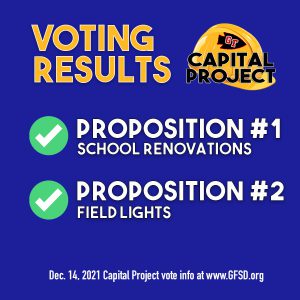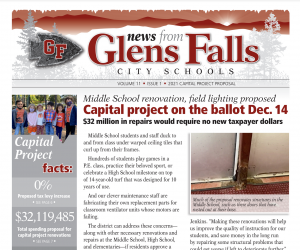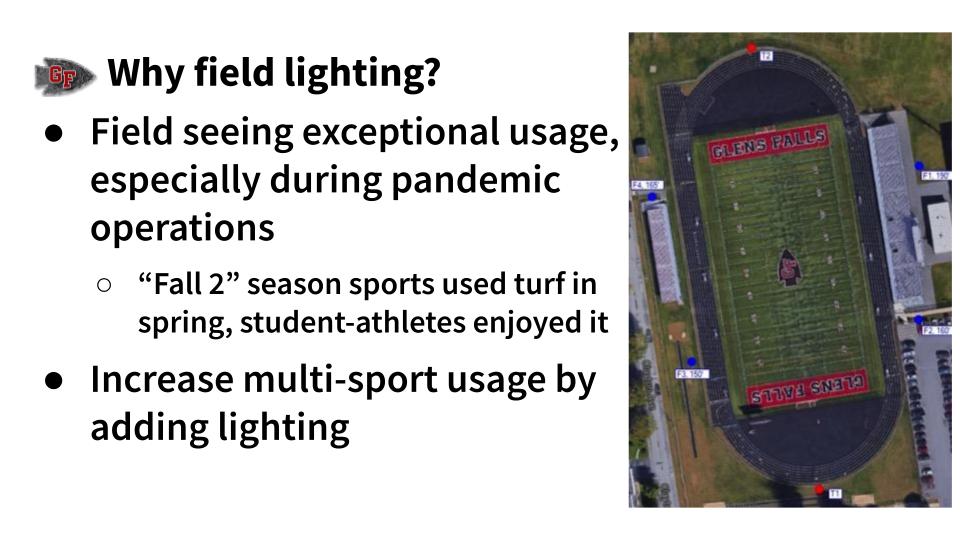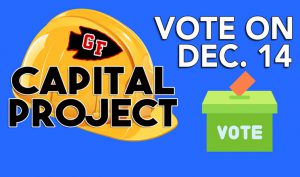Middle School renovation update: Aug. 29, 2023
Glens Falls residents vote “Yes” on both propositions of the capital project
Renovations and field lights both pass in public vote Dec. 14, 2021

December 14, 2021—Glens Falls City School District residents approved both the renovations and field lighting propositions of the 2021 capital project proposal in today’s public vote.
Proposition #1 (renovations) passed by a margin of 831 “yes” votes to 190 “no” votes – an 81.4 percent approval rate. Proposition #2 (lights on the field) passed by a margin of 589 “yes” votes to 431 “no” votes – a 57.7 percent approval rate.
The $32.1 million approved plan carries no tax levy increase. State aid covers 75.3 percent of the total cost, including the lighting on Putt LaMay Field. Most of the project involves renovations at the Glens Falls Middle School, including ceiling tile and door replacement, renovation of the Large Group Instruction room into a 21st century classroom space, refurbishing science classrooms, and installation of a fitness/sitting area outside behind the cafeteria.
Also included in the project are replacement of the High School’s track and turf sports field, renovations to the High School’s chorus/music rooms, fitness room reconstruction and expansion, and parking lot resurfacing.
The full list of renovations/repairs and other archived capital project materials can be found on the district’s website, www.gfsd.org.
On the ballot Tuesday, December 14, 2021
-
$32.1 million project
-
No tax levy increase
-
Bulk of project: renovations at Middle School
-
Separate proposition for field lighting
On Tuesday, December 14, 2021, Glens Falls City School District residents will decide on a $32.1 million capital project proposal during a public vote from noon – 9 p.m. at Sanford Street School. The proposal carries no tax levy increase.

Most of the project involves renovations at the Glens Falls Middle School, including ceiling tile and door replacement, renovation of the Large Group Instruction room into a 21st century classroom space, refurbishing science classrooms, and installation of a fitness/sitting area outside behind the cafeteria.
Also included in the project are replacement of the High School’s track and turf sports field, renovations to the High School’s chorus/music rooms, fitness room reconstruction and expansion, and parking lot resurfacing.
There is a separate proposition on the ballot to install glare-controlled LED field lighting to the High School’s turf field. Adding lights to the field would best expand student access to, and use of, the fields in late fall and early spring.
Capital project on the ballot Dec. 14, 2021
Middle School students and staff duck to and from class under warped ceiling tiles that curl up from their frames.
Hundreds of students play games in a P.E. class, practice their beloved sport, or celebrate a High School milestone on top of 14-year-old turf that was designed for 10 years of use.
And our clever maintenance staff are fabricating their own replacement parts for classroom ventilator units whose motors are failing.
The district can address these concerns—along with other necessary renovations and repairs at the Middle School, High School, and elementaries—if residents approve a proposed capital project when they vote on December 14th. State aid covers 75.3 percent of the proposed $32.1 million renovation project, which includes a separate proposal to install lighting on Putt LaMay Field.
Problems identified in the independent building conditions survey—such as failing windows and doors—would be fixed through the proposed repair project that won’t raise local property taxes. The district plans to use state building aid and up to $5.5 million of savings already on hand in unreserved fund balance to cover the project costs.
“The Middle School is our one building that really hasn’t had any major work done since it was built in 1985,” says superintendent Paul Jenkins. “Making these renovations will help us improve the quality of instruction for our students, and save money in the long run by repairing some structural problems that could get worse if left to deteriorate further,” he continued. “This is one kind of sustainable investment that has a direct impact on our educational program.”
Before the COVID-19 pandemic, our most recent building conditions survey—required by state education law every five years—showed a need for widespread ceiling, window, and door replacement at the Middle School, due to security and ventilation concerns. The High School’s turf field and track are already 4 years past their 10-year life expectancy for safety and durability. Outdated science classrooms need new electrical wiring and hot water access, while old music rooms need better functionality and heating control. The Middle School’s large-group instruction room is under-utilized in its rigidly archaic layout.
“We know that infrastructure does have an impact on the experience the students are receiving in the buildings, and in their classrooms,” says assistant superintendent for business Bobby Yusko. “That for us, is a major issue if facility or equipment problems are detracting from their ability to learn.”
Lights on the field
Separate from the main capital project ballot item is Proposition #2, which would authorize the district to spend up to $736,072 to install glare-controlled, energy-efficient LED lighting on the High School’s turf field. (See page 11 for full details on the proposition.)

“Because of the pandemic, we held our fall sports in the early spring last year,” says Mr. Jenkins. “That meant most of our teams needed to use the turf field instead of the frozen or muddy grass fields. We found that student-athletes really enjoyed playing on the turf, and the best way to increase their access is to install field lighting.”
The actual estimate for purchase and installation of the field lights is $475,000. But requirements to add contingency, escalation, and incidental costs bring the proposal amount to $736,072.
“We’re asking voters to authorize up to $736,072 for the lights,” explains Mr. Jenkins. “Our best estimate is that we’re not going to have to expend that much.” In fact, projected building aid on the lights is $554,262, making the local share of the cost $181,810.
“We take our role in the community very seriously, and have always worked to make the best use of the facilities our collective tax dollars support. There is a balance between school pride and our responsibility to be a good neighbor to our surrounding residents, and we believe we can achieve that positive outcome.”
Concerns from residents in the immediate neighborhood of the High School/Middle School complex focus on the traffic, parking, and sound associated with night games under the lights—and less on the lights themselves. Sound mitigation strategies, parking enforcement, and traffic control are all part of the district’s ongoing efforts regardless of the lighting proposal’s outcome.

